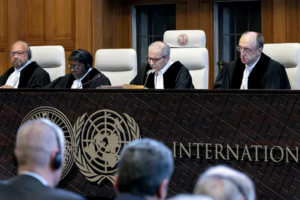The ICJ has demolished one of Israel’s key defenses of the occupation

ICJ President Nawaf Salam (2nd R) delivers the ruling on the occupation of the West Bank and East Jerusalem on 19 July 2024
Aeyal Gross writes in Haaretz on 19 July 2024:
When he was Israel’s Attorney General, Meir Shamgar (who later became President of Israel’s Supreme Court) said that the occupation is a “factual situation” which, pending a political or military alternative, could, from a legal point of view, “continue indefinitely.” On Friday, the International Court of Justice in The Hague comprehensively demolished his argument and with it one of Israel’s key, longstanding defenses of its occupation.
The ICJ’s advisory opinion on Israel’s occupation of the area known in international law as the “Occupied Palestinian Territory” holds that while there is no time limit on occupation, it can not be an indefinite form of control: it must be temporary. Occupation, emphasized the Court, is a temporary situation to respond to a military necessity, and it cannot transfer the title of sovereignty to the occupying state. Moreover, the occupying state is duty-bound to administer the territory for the benefit of the local population.
The key points in the ICJ’s opinion
- Israel’s ongoing presence in the occupied Palestinian territories is deemed illegal.
- Israel must end its presence in the occupied territories as soon as possible.
- Israel should immediately cease settlement expansion and evacuate all settlers from the occupied areas.
- Israel is required to make reparations for the damage caused to the local and lawful population in the Palestinian territories.
- The international community and organizations have a duty not to recognize the Israeli presence in the territories as legal and to avoid supporting its maintenance.
- The UN should consider what actions are necessary to end the Israeli presence in the territories as soon as possible.
The ICJ did not leave any stone unturned in finding that Israel violates these principles. It considered the way in which Israel’s settlements policies – which, it held, violated the Geneva Convention’s prohibition on transferring the occupying power’s own civilians into the occupied territory – are part of a regime that annexes at least part of the territory. This annexation is apparent in Israel’s application of its own laws in parts of the West Bank (when it is applied to Israeli settlers) and in East Jerusalem (which the Court considers as part of the Occupied Palestinian Territory).
The ICJ found that Israel’s annexational policies contravene the principles of international law that require that occupation be temporary and prohibits the acquisition of territory by force.
Israel’s vast confiscation of land and discriminatory water policy, the Court held, amount to the dispossession of Palestinians and violate the principle of administering the territory for the benefit of the local population. The Court also addressed Israel’s discriminatory planning policies and the demolition of Palestinian homes (be they punitive or based on “planning” considerations). That Israel does not prevent or properly punish settler violence against Palestinians is also central to the Court’s understanding of how Israel violates this obligation.
The Court also addressed in detail Israel’s discriminatory legislation and policies in the Occupied Territories. While it held that Israel’s actions amount to systematic discrimination, and violate the United Nations’ Convention on the Elimination of Racial Discrimination prohibition on “segregation and apartheid,” the ICJ stopped short of determining whether the situation constitutes “only” segregation or, in fact, amounts to “apartheid.” Presumably this ambiguity was deliberate, allowing as many judges as possible to join the majority – regardless of their view on this point.
All of this led the Court to hold that Israel, by its continued, indefinite, discriminatory and annexational control of the territories, violates the Palestinians’ right to self-determination and the prohibition on the acquisition of territory by force.
The Court’s bottom line was thus very clear: Israel’s continued presence in the Occupied Palestinian Territory is illegal. It must bring an end to its presence there “as rapidly as possible,” and it must “immediately” cease all new settlement activity.
The contrast between the two determinations is striking. On one hand, the Court rejected the notion that Israel can continue its occupation of the territories indefinitely, and that the occupation cannot continue until, in Shamgar’s terms, there is an alternative political or military situation, i.e. pending an Israeli-Palestinian peace agreement.
On the other hand, the Court did not order Israel to end the occupation “immediately” but “as rapidly as possible” – again, language which may reflect a compromise between various judges.
But this ambiguity should not undermine the thrust of the ICJ’s ruling: occupation is not just a “factual” situation but a “normative” one. Israel’s occupation, typified by settlements and by the dispossession of the local population, by annexational practices and by the negation of Palestinian self-determination, violates the norms that govern any occupation, and must end. Legally, Israel will no longer be able to argue that its occupation is “temporary” until an agreement in the indeterminate future is reached.
In 1971, when the ICJ held that South Africa’s continued control of Namibia was illegal, it wrote: “The Court considers that the qualification of a situation as illegal does not by itself put an end to it. It can only be the first, necessary step in an endeavor to bring the illegal situation to an end.” These words may well resonate today.
Aeyal Gross is a professor of constitutional and international law at Tel Aviv University.
This article is reproduced in its entirety
